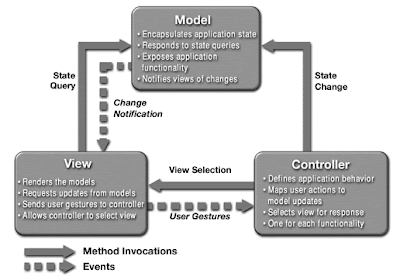There is this blog entry on the Model/View/Controller design pattern, and Jeff and Joel Spolsky also discussed that during their podcast. I consider the "Model=HTML, View=CSS and Controller=Browser"-explanation misleading (I would not go so far to call it "completely wrong", it's just not a great analogy). HTML and CSS are declarative languages, not Models/Views in an OOP sense. The browser application's code and data structures are the building blocks for Model, View and Controller. So the browser IS Model, View and Controller.
By definition, the Model represents application state, the View defines how Model data is rendered into the UI and the Controller takes user input and changes the Model accordingly, resp. invokes application functionality.
One could favorably argue that HTML is a source of data for the browser's Model, and that CSS also affects the way the View does the rendering. But Model and View themselves are something else, they are browser-internal software components that represent web content (Model) resp. are responsible for visualizing that web content on a UI platform (View). Remember the View serves as an Observer on Model data - that just doesn't fit with CSS and HTML. And that's why I think the comparison is a little bit far-fetched.
Take a CAD application as another example of a Model that contains some kind of graphical artefacts simply because that's the nature of the application (just like web content in case of a browser). The CAD Model might consist of shapes and polygon definitions, and the CAD View then renders that into a two-dimensional UI.
Here is a diagram taken from the J2EE Architecture blueprints that pretty much sums up things (yeah I know this article refers to N-tier architecture, but the diagram is valid for all MVC-secnarios).

Jeff Atwood noted that he could not find any MVC documentation that really pleased him and that he could do better (hey, why not take the GoF book - MVC is described in the introduction chapter). Sorry to say that in this case he didn't comply with his own high standards.
Then there was a remark about SqlServer as being pretty much standalone self-tuning. As much as I appreciate SqlServer, it's really not self-tuning. Don't get me started on all that query optimizer issues I have been through (admitted this has gotten better in the latest versions). It's also a must to define a customized maintenance plan on SqlServer. But maintenance plans are kind of cumbersome or even impossible on desktop/express engines, and on those engines self-tuning would be essential (as there is no database admin to take care of such things). If I had to name a self-tuning database, it would be Sybase SQLAnywhere Personal Server - no big surprise as it has been designed for smaller-than-enterprise usage.
Finally Jeff stated that he sees no difference between computer science and software engineering. I'd like to quote Steve McConnell at this point (and by the way, coincidently the term "Coding Horror" descends from Steve McConnell's book "Code Complete"):
Scientists learn what is true, how to test hypotheses, and how to extend knowledge in their field. Engineers learn what is true, what is useful, and how to apply well-understood knowledge to solve practical problems.
Scientists must keep up to date with the latest research. Engineers must be familiar with knowledge that has already proven to be reliable and effective. If you are doing science, you can afford to be narrow and specialized. If you are doing engineering, you need a broad understanding of all the factors that affect the product you are designing.
Scientists don't have to be regulated because they are chiefly accountable to other scientists. Engineers do have to be regulated because they are chiefly accountable to the public.
An undergraduate science education prepares students to continue their studies. An undergraduate engineering education prepares students to enter the workforce immediately after completing their studies.
But hey, just as Jeff remarked repeatedly, it's also fine to disagree every now and then.
